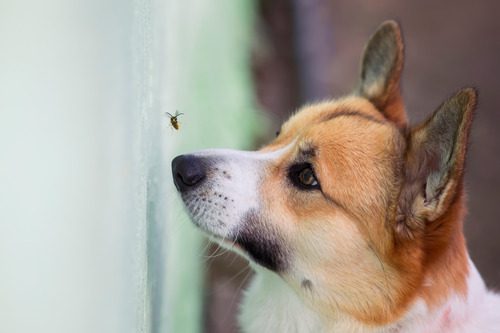My Dog Was Stung By a Bee – What Should I Do?

It’s a sunny afternoon and your dog is happily sniffing around the yard until suddenly, they yelp and start pawing at their face or limping on one leg. You spot the culprit: a bee. While some dogs may barely react, others might experience noticeable swelling or even more serious symptoms. Knowing what to expect and how to respond can make a big difference in helping your pet stay comfortable. This blog covers what you should know if your dog was stung by a bee, when to contact your veterinarian, and what to watch for after the sting. For professional guidance, call Yalesville Veterinary Hospital at (203) 265-1646 or book an appointment online today.
Why Dogs Get Stung by Bees in the First Place
Dogs are naturally curious. Whether they’re chasing bugs in the garden or investigating a buzzing sound, they tend to get up close…sometimes too close. This puts them at risk for bee stings, especially during spring and summer when bees are most active. Most stings happen around the face, mouth, or paws. These areas are exposed during playtime and exploration, and they’re also where dogs tend to snap or paw at flying insects. While a single sting is often not life-threatening, it can still be painful or uncomfortable. Understanding how dogs get stung helps explain where you’re likely to find symptoms and why prompt attention is necessary.
Common Signs Your Dog Was Stung By a Bee
If your dog was stung by a bee, their reaction may vary based on the location of the sting, the number of stings, and how sensitive they are to the venom. In most cases, signs appear quickly, often within minutes.
Mild Reactions to a Bee Sting
For many dogs, a bee sting results in mild, localized symptoms that go away within a day or two. These may include:
- Swelling at the sting site
- Redness or irritation
- Whimpering or licking the affected area
- Temporary limping if the paw was stung
- Sensitivity to touch
Dogs with these symptoms typically appear uncomfortable but remain alert, playful, and interested in food or attention.
Moderate to Severe Reactions
While not as common, some dogs may experience a more intense response. This can happen due to multiple stings or because the sting is in a sensitive area like the mouth or throat. Signs may include:
- Hives or widespread swelling
- Facial swelling that worsens over time
- Drooling or difficulty swallowing
- Vomiting or diarrhea
- Weakness or disorientation
Signs of an Allergic Reaction
In rare cases, a dog stung by a bee may go into anaphylactic shock, which is a serious medical emergency. Symptoms to watch for include:
- Pale gums
- Difficulty breathing
- Collapse or sudden lethargy
- Rapid heartbeat
If you notice any of these signs, contact your veterinarian immediately by calling Yalesville Veterinary Hospital at (203) 265-1646.
What to Do If Your Dog Was Stung By a Bee
If your dog was stung by a bee, your next steps depend on the severity of their reaction. The most important thing is to remain calm so you can respond appropriately.
Check for the Stinger
Bees leave behind their stingers, which can continue to release venom for a short time. If the sting is from a bee (not a wasp or hornet), look for a small black dot at the center of the swollen area. Avoid squeezing the stinger as this can release more venom. Instead, use the edge of a credit card to gently scrape it away.
Keep Your Dog Comfortable
After removing the stinger, keep your dog calm and monitor the swelling. Prevent them from licking or scratching the area, as this can lead to further irritation. Offer a quiet space and stay close by to observe their behavior.
Call Your Veterinarian
If your dog was stung by a bee and shows moderate to severe symptoms or if you’re unsure how serious the sting is, it’s best to call your vet. Yalesville Veterinary Hospital can assess your pet’s condition and let you know if treatment is necessary. Even if the reaction appears mild, calling your vet provides peace of mind. Your veterinarian may recommend a visit based on your dog’s size, medical history, and where the sting occurred.
Potential Complications From a Bee Sting
Most bee stings in dogs resolve without complications, but there are exceptions. Certain locations and responses require more attention and, in some cases, veterinary care.
Stings Inside the Mouth or Throat
If your dog tries to bite a bee and gets stung inside the mouth or throat, swelling can interfere with breathing. These cases are more serious because of the risk of airway obstruction. Contact your veterinarian immediately if your dog was stung by a bee in the mouth or shows any signs of labored breathing.
Multiple Stings
Dogs that disturb a nest may suffer multiple stings in a short period. The venom from multiple bee stings can overwhelm the body and cause more serious side effects, even in dogs that don’t normally have allergic reactions. Signs can escalate quickly and require urgent care.
Delayed Reactions
In some cases, symptoms don’t show up right away. You may notice your dog acting sluggish, itchy, or puffy several hours after the sting. These delayed responses still warrant a call to your veterinarian, especially if they worsen over time.
How to Prevent Future Bee Stings
Preventing your dog from being stung by a bee isn’t always possible, but there are steps you can take to reduce the risk.
- Supervise your dog during outdoor playtime
- Keep them away from flower beds or areas where bees tend to gather
- Avoid letting them chase or snap at flying insects
- Check your yard regularly for hives or nests, especially in warmer months
If your dog has reacted strongly to a bee sting in the past, your veterinarian may advise additional precautions during outdoor activity.
Knowing When It’s Time to Call Yalesville Veterinary Hospital
If your dog was stung by a bee, it’s always best to err on the side of caution. A single sting might look mild at first but can develop into something more serious depending on where and how your dog was affected. Whether you’re seeing swelling, unusual behavior, or aren’t sure what to look for, a quick call can make all the difference. Our team at Yalesville Veterinary Hospital is prepared to help. We’ll guide you on what to do next, and if your pet needs care, we’ll make sure they’re treated with comfort and attention. Call us at (203) 265-1646 or book an appointment online today.
